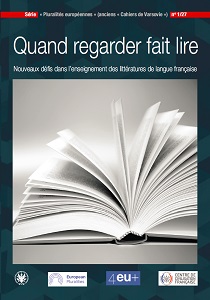Récits cinématographiques et récits littéraires dans l’oeuvre de l’écrivain-cinéaste franco-algérien Mehdi Charef
Cinematographic and Literary Narratives in the Work of the Writer and Filmmaker Mehdi Charef
Author(s): Hans-Jürgen Lüsebrink
Subject(s): Theoretical Linguistics, Applied Linguistics, Philology
Published by: Wydawnictwa Uniwersytetu Warszawskiego
Keywords: writers-filmmakers; ‘beur’ film; ‘beur’ literature; suburbs; marginalization
Summary/Abstract: This contribution is focused on the question of the relation between film and literary writing in the work of Mehdi Charef (born in Algeria in 1952) who is currently one of the most important filmmakers and writers of North African origin in contemporary France. After a preliminary part on central concepts like ‘Intermediality’, this contribution analyzes the specificity of the filmic and lite-rary work of Charef, who became the very first ‘beur’-writer and filmmaker with his novel Le thé au harem d’Archi Ahmed (1983), which he adapted himself for the screen in 1985 under the title Le thé au harem d’Archimède. Refusing to be classified as an ‘immigrant writer and filmmaker’, his further 12 films and 5 novel streat a large diversity of subjects, generally linked to social and cultural margina-lity and to the “Algerian War” (1954-1962). He sees it as a major event of contemporary French-Algerian history with its numerous ‘black boxes’ of memory like the ‘Harkis’ and the Algerian soldiers fighting on the French side. As Charef has approached the same subjects both in film and literary texts, the analysis of his work leads to a reflection on the relationship between the two media and their common use in literary pedagogy.
- Page Range: 89-100
- Page Count: 12
- Publication Year: 2019
- Language: French
- Content File-PDF

